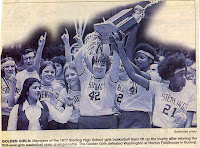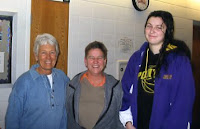Think your life is tough? Imagine learning to swim without legs? Then go out and break the world record. Not once, but twice.
In the Beijing Paralympics 2008, Teresa Perales broke the record for 50-meter freestyle (35.88), the 100-meter freestyle (1:16.65), and collected 3 gold medals, 2 bronze medals and a silver medal.
From Sydney to Athens to Beijing, the dark eyed, 36-year-old athlete starred on the Spanish Paralympics team for the past 3 Paralympics Games winning 16 medals total. Not bad for someone who learned to swim at age twenty, without the use of her legs.
At the age of nineteen, Teresa contracted a neuropathy in her legs, a residual effect of another illness. Since then she has been wheelchair bound, but that never slowed her down. Listening to her speak one would think her wheels were the best pair of legs ever invented. The inspirational speaker reminds students at my school that it’s all about attitude.
“You have the possibility to create your own happiness,” Teresa says with an infectious smile. “It does not depend on other people or things.”
Or legs.
“I keep my wheelchair in my bottom, “ she insists, “not my head.”
As a teenager Teresa only practiced one sport, karate, but as a paraplegic, she tried diving, car rally racing and horseback riding before deciding she liked swimming the best.
“Don’t your legs sink and slow you down?” one primary student, at my school, asked.
Teresa laughed and said, “Not if I swim fast enough. I start off the block because then my legs are buoyed up, at least at the very beginning of the race.”
In addition to her work in politics with the City Council of Zaragoza in sport and tourism, she trains six hours a day in preparation for the 1012 Olympics in Barcelona. She adheres to the principles any athlete follows. Courage. Sacrifice. Support. (Family and team) Hard work.
In 2007, she and her husband, Mariano Menor, wrote the book, My Life on Wheels.
Teresa travels the world, works, trains and raises a one-year-old son. He stole the show by crawling from his father’s arms across the stage and pulling himself to stand by his mom’s wheelchair.
“Do you ever wish you could walk again?” One boy asked.
“No, about three months after my legs went numb, I realized my feet are not that important. I am lucky to live in a country that recognizes disabilities,” she explains. “Many places in the world still hide any kind of handicap in hospitals, institutions, and homes. I have met people of all different cultures, religions, languages, customs and disabilities.”
Handicapped? No way.
She could “run” circles around most of us.




